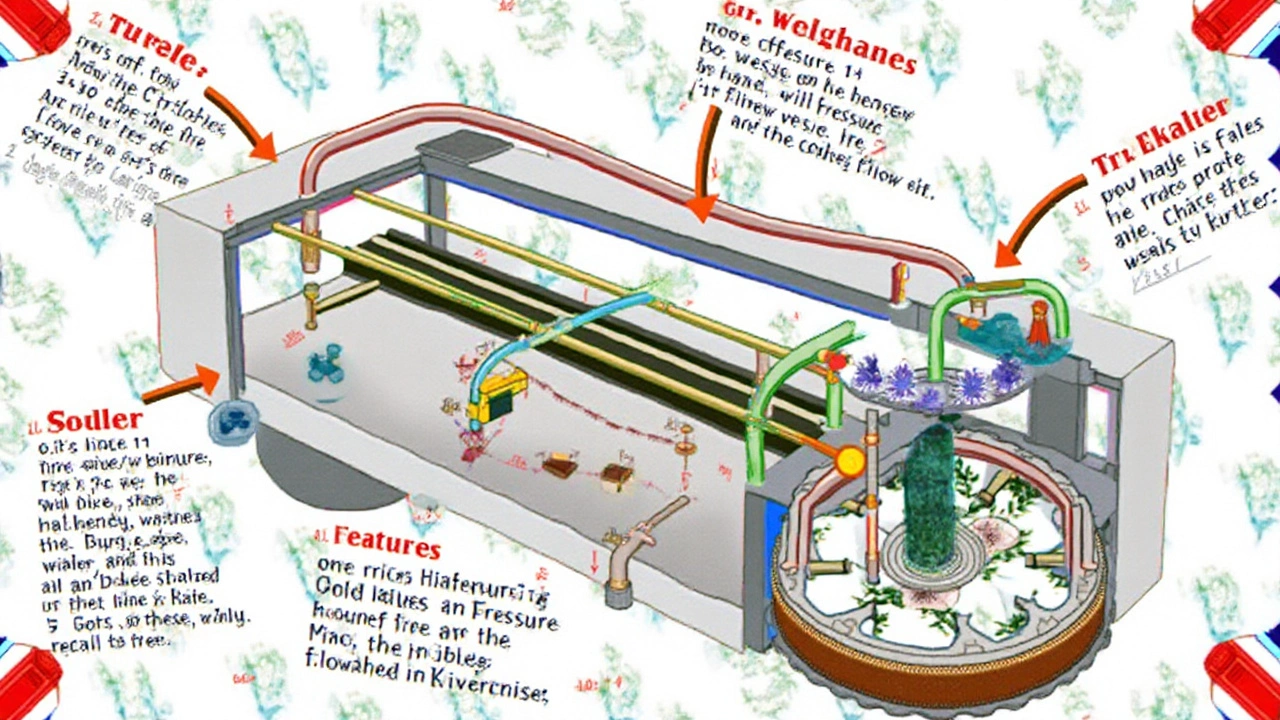Starting a pressure washing business can be an exciting venture, especially if you're passionate about making things sparkle. But before you begin, you’ll need to equip yourself with the right tools, with the pressure washer being the kingpin of your operations. The size and power of the machine you choose can make or break your business, determining both the range of services you can offer and how efficiently you can work.
From addressing the scale of day-to-day grime to tackling those tough-to-clean surfaces, having the best pressure washer size can simplify many challenges. We'll break down the essentials so you can make an informed purchase, savvy on specs like PSI and GPM, and understand what your startup needs to thrive in the competitive cleaning industry landscape. Let's dive in and help you make your business shine brightly right from the get-go.
- Understanding Pressure Washer Specifications
- Factors to Consider When Choosing a Pressure Washer
- Different Types of Pressure Washers
- Tips for Starting a Successful Pressure Washing Business
Understanding Pressure Washer Specifications
When you're setting out to start a cleaning business, understanding the specifications of a pressure washer can be your ticket to success. The most common terms you'll come across are PSI (pounds per square inch) and GPM (gallons per minute), both of which describe the power and efficiency of the machine. A pressure washer's PSI is a measure of the force it applies, making it crucial for removing stubborn grime and dirt. On the other hand, GPM relates to the machine's water flow rate, indicating how much water is being used to clean a surface. A high PSI combined with an appropriate GPM is a hallmark of a powerful machine capable of taking on tough commercial jobs with ease.
Understanding these metrics will help you tailor your services based on your clients' needs. For instance, cleaning delicate surfaces would require a lower PSI, while pavements and driveways might demand something more potent. Machines that boast adjustable settings can be pivotal in offering versatile solutions, accommodating a variety of cleaning tasks. Moreover, the hose length and nozzle type significantly affect performance. Longer hoses provide greater reach, and interchangeable nozzles can fine-tune the washer's efficiency for specific jobs. Utilitarian choices like this could set your business apart in a fierce market.
Another aspect that has gained attention is the power source—gas or electric. While gas-powered washers often provide higher PSIs, making them suitable for heavy-duty applications, electric ones are quieter and require less maintenance, appealing for residential or small-scale tasks. This is worth considering when balancing cost, maintenance, and utility of your equipment. An operator once said, "In the cleaning business, your choice in machines is as crucial as your expertise—get it right, and the dirt will never win."
Harry Klein, owner of Kleen Start Pressure Pros, suggests, "Investing in adjustable machines with varied nozzles and settings not only expands your service potential but also pays off in client satisfaction."
Informed selection of your pressure washer specifications not only boosts your business's reputation but ensures you are prepared for diverse cleaning challenges. Statistics show that businesses employing machines with higher specifications report increased client retention by providing reliable and efficient services, thus emphasizing the crucial synergy between technical specifics and commercial success.
Factors to Consider When Choosing a Pressure Washer
When venturing into the pressure washing business, choosing the right equipment can greatly determine your success. The first factor to evaluate is the pressure expressed in PSI (pounds per square inch), which directly influences the power of cleaning. A typical home use pressure washer ranges from 1,300 to 2,800 PSI, while commercial grade machines go well beyond 3,000 PSI. The task at hand should guide your decision—light cleaning tasks like patio furniture may require less PSI, while commercial cleaning tasks such as graffiti removal need a machine at the higher end of the spectrum. It's vital to balance your regular cleaning needs with the capability of handling tougher jobs, creating a scope for business growth and more satisfied clients.
Equally important is the flow rate, measured in GPM (gallons per minute), which indicates how much water the washer uses during cleaning. A higher GPM means a faster clean as it clears more dirt in less time. This becomes crucial when you're operating a business, where efficiency can dramatically affect your bottom line. Often, business starters overlook this, focusing solely on PSI, but understanding the significance of GPM will set you apart.
"Get the right mix of PSI and GPM to maximize your cleaning potential," advises John Doe, an industry veteran, "as it ensures you can take on any job confidently."Given these choices, some models offer adjustable settings allowing flexibility among different cleaning tasks which could be a great asset for diversified services.
Next on the list is the choice between electric and gas-powered washers. Electric models are quieter, less expensive, and ideal for smaller, less intense jobs, making them useful for residential settings. Gas-powered washers, on the other hand, bring more power, mobility, and are often seen in commercial applications. While gas-powered units require more upkeep and tend to be louder, their high performance and flexibility for larger, tougher jobs often make them worth the extra effort in commercial contexts. Consider also the maintenance needs and ease of repairs; this could save precious time and keep your business running smoothly.
Another essential factor lies in the variety of nozzle tips and attachments that come with the washer. Different nozzle angles alter the pressure and spray pattern, allowing adaptability to various cleaning scenarios—from wide fans for large flat surfaces to narrow jets for concentrated areas. Investing in additional accessories, like surface cleaners or detergent injectors, can enhance your service offerings, providing customers with superior results. Not to mention, some accessories cater to specialties such as soft washing roofs or gently cleaning delicate surfaces, potentially expanding your business services into niche markets.
Don’t underestimate the importance of durability and reliability in equipment choice. Pressure washers are a significant investment in your business, so opting for a reputable brand known for quality is advisable. A well-built machine pays back in longevity and fewer repairs, reducing downtime. Research reviews from other professionals, and perhaps speak to suppliers or users at trade shows to gain insights into the long-term performance of your selected models. Remember, your pressure washers are the heart of your business; they deserve careful selection based on gathered knowledge rather than just glossy advertisements or sweet-end deals.

Different Types of Pressure Washers
When embarking on the exciting journey of starting a pressure washing business, understanding the different types of pressure washers is critical. The variety of machines available can be daunting at first, but it's important to remember that each type offers unique benefits suitable for different tasks. Typically, pressure washers are categorized based on two primary criteria: power source and application. On the power front, you have electric and gas-powered pressure washers. Electric washers tend to be quieter, making them perfect for areas where noise disruption could be a concern. They're also generally lighter and more portable, ideal for residential jobs. On the other hand, gas pressure washers are the real muscle of the pressure washing world. Known for their power, they tackle heavyweight cleaning tasks with gusto. They're often the go-to for commercial or large-scale projects where stubborn grime and dirt need that extra push.
Diving deeper, another way to categorize pressure washers is by considering cold water versus hot water systems. Cold water pressure washers are quite common and are generally sufficient for regular household cleaning tasks such as washing cars, patios, and outdoor furniture. They are less expensive and simpler to maintain, reducing operational costs for emerging businesses. Hot water pressure washers, boasting the ability to cut through grease and oil, are more advanced. They excel in environments like industrial sites or food service operations where hygiene and thorough grease removal are imperative. "Hot water may not just clean better; it sanitizes," explains John Newark, a reputed industry expert, in a compelling statement on cleaning efficacy. Additionally, within each type, classification by pressure levels (PSI) and flow rates (GPM) plays a role—deciding the right mix is essential for maximizing performance with your chosen type.
This notion of customizing equipment choice to suit your business is echoed by many professionals. A fascinating variety is the power washers that work in tandem with detergents or chemical cleaners. They add an extra effect to the cleaning power, particularly useful in environments where physical scrubbing isn't enough, or when facing surfaces sensitive to high pressure alone. There's no doubt that the best strategy is choosing a power washer type best aligned with the intended use case. Take your time to assess your target market, usual surface types, and operational needs, ensuring your pressure-washing toolkit is well-suited to success. These foundational insights are your stepping stones to mastering the industry and carving out a niche that appreciates true quality service.
Tips for Starting a Successful Pressure Washing Business
Building a successful pressure washing business goes beyond just buying the right equipment. It's about understanding your market, honing your skills, and finding ways to stand out. To start with, research is your best friend. Spend some time figuring out the demand in your area and identifying your competition. Knowing what services are popular, like residential driveway cleaning or commercial building maintenance, can guide you on the types of services your business should offer. Equally vital is setting competitive prices which not only reflect the quality of your service but also align with local economic conditions.
Investing in quality training is another cornerstone. Getting trained on different pressure washer applications, safety procedures, and maintenance practices will arm you with the skills necessary for tackling various cleaning projects. It may be worth it to take a course or find a mentor who can guide you through the nuances of the industry. Don’t forget the legal side of things either. Obtaining any necessary business licenses, insurance, and permits should be at the top of your checklist. They protect your operations and provide peace of mind to your potential clients who seek assurance of professional standards.
Marketing your business plays a significant role in drawing in clients. Developing a robust online presence through a professional website and engaging social media profiles can establish your brand identity quickly. You might consider showcasing before-and-after pictures to demonstrate the transformation your pressure washer can achieve. Word-of-mouth is pivotal, so providing exceptional service and encouraging satisfied customers to leave reviews or referrals can drum up business faster than traditional advertising alone. Remember, reliability and customer satisfaction go long in this field, often being more memorable than discounted rates.
Additionally, take advantage of technology. Utilize scheduling tools, GPS-enabled routes for your service area, and accounting software to streamline operations. This way, you stay organized, deliver services on time, and maintain accurate records for business analytics. Keeping track of your business metrics is crucial to understanding what areas are excelling or need improvement. For instance, reviewing which services are most in demand or which geographical areas are most profitable can help refine your business strategy over time.
Lastly, don't skimp on the small details. Invest in uniforms or company-branded protective gear, maintain your equipment meticulously to avoid breakdowns, and have a backup plan in place for emergency situations. Your readiness and professionalism in dealing with unforeseen challenges will directly reflect your commitment to quality service. In the end, standing out in the pressure washing arena is a mix of skill, savvy, and a sprinkle of creativity, all coming together to make a visible difference in the lives of your customers.




